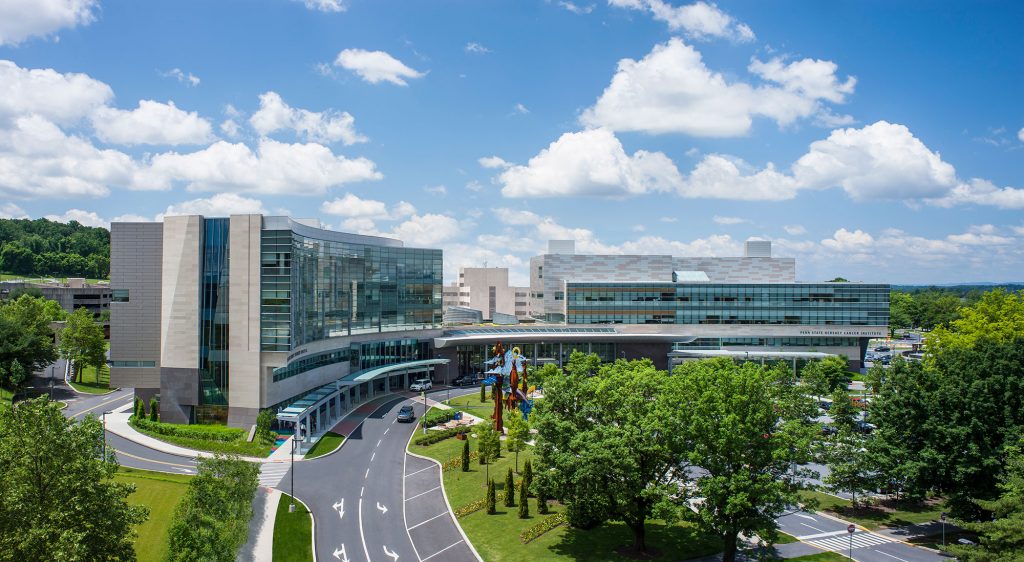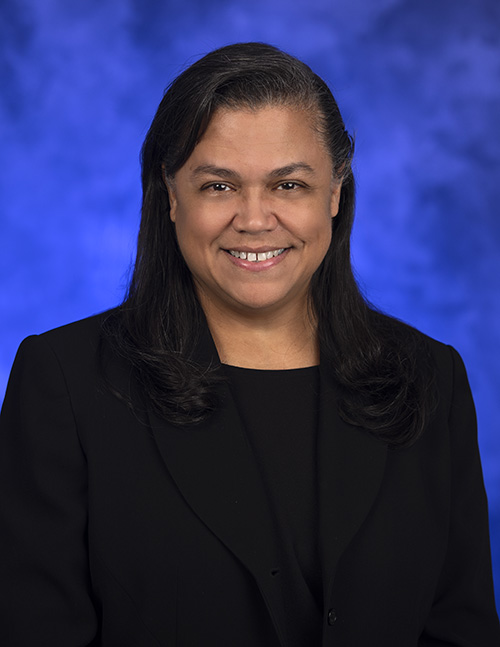Jump to topic
Search
Program Details
The one-year Breast Imaging Fellowship position in the Department of Radiology at Penn State Health/College of Medicine is designed to provide the fellow with an in-depth clinical experience in breast imaging and breast disease management.
Penn State Breast Center, a state-of-the-art facility, sees hundreds of new breast cancers and performs tens of thousands of breast imaging studies each year. The fellowship offers 12 months of comprehensive training, including:
- Screening mammography utilizing digital breast tomosynthesis
- Screening breast ultrasound (automated whole breast)
- Screening breast MRI
- Diagnostic mammography (3D) and stereotactic (3D) biopsy
- Diagnostic breast ultrasound and intervention
- Diagnostic MRI and MRI-guided intervention
- Needle localizations and Savi Scout (wireless) localizations
Fellows will participate in weekly multidisciplinary conferences and monthly journal club. There is ample opportunity for involvement in clinical research, and participation in a scholarly project is strongly encouraged. In addition, the fellowship offers dedicated time to shadow breast surgery, medical and radiation oncology, plastic surgery, genetics and high-risk counseling.
Dedicated breast radiology faculty perform imaging and minimally invasive biopsies as a part of an integrated, collaborative practice with breast surgery and oncology colleagues. The Breast Center was one of the original recipients of the ACR Breast Imaging Center of Excellence Award and has NAPBC certification.
The fellowship is geared toward setting the stage for success, whether the graduate chooses an academic or community practice career.
Learn More about the Fellowship
General Application Information
The Breast Imaging Fellowship participates in the National Resident Matching Program (NRMP), sponsored by the Society of Breast Imaging.
In order to become a Breast Imaging fellow at Penn State, applicants must register with the NRMP for the fellowship match. The Society of Breast Imaging has implemented an “all-in” policy for the Match. This means that programs participating in the Match include all available positions in the match and cannot extend any offers to candidates outside of the match.
See details on the Match program.
With questions, contact Myriam Correa, program coordinator, at mcorrea@pennstatehealth.psu.edu.
Supplemental Application Materials
In addition to registering for the Match, applicants must email a CV, personal statement and three letters of recommendation to mcorrea@pennstatehealth.psu.edu.
Key Dates
- Nov. 1, 2024: Programs may accept applications
- Jan. 13, 2025: Virtual interview period begins
- March 2025: Match opens (specific date TBA by NRMP)
- March 31, 2025: Last day of interview period
- April 2025: Ranking opens (specific date TBA by NRMP)
- May 2025: Ranking closes (specific date TBA by NRMP)
- June 2025: Match Day (specific date TBA by NRMP)
- July 1, 2026: Training begins
Virtual Tour
Penn State Health
Penn State Health is an integrated academic health system serving patients and communities across 15 counties in central Pennsylvania. It employs more than 20,900 people systemwide.
The system includes Penn State Health Milton S. Hershey Medical Center, Penn State Health Children’s Hospital and Penn State Cancer Institute based in Hershey, Pa.; Penn State Health Hampden Medical Center in Enola, Pa.; Penn State Health Holy Spirit Medical Center in Camp Hill, Pa.; Penn State Health Lancaster Medical Center in Lancaster, Pa.; Penn State Health St. Joseph Medical Center in Reading, Pa.; Pennsylvania Psychiatric Institute, a specialty provider of inpatient and outpatient behavioral health services, in Harrisburg, Pa.; and 2,417 physicians and direct care providers at 225 outpatient practices. Additionally, the system jointly operates various healthcare providers, including Penn State Health Rehabilitation Hospital, Hershey Outpatient Surgery Center and Hershey Endoscopy Center.
In 2017, Penn State Health partnered with Highmark Health to facilitate creation of a value-based, community care network in the region.
Penn State Health shares an integrated strategic plan and operations with Penn State College of Medicine, the University’s medical school. With campuses in State College and Hershey, Pa., the College of Medicine boasts a portfolio of more than $150 million in funded research and more than 1,700 students and trainees in medicine, nursing, other health professions and biomedical research.
Learn more about Penn State Health

Penn State Health Children’s Hospital (left), Penn State Health Milton S. Hershey Medical Center (center) and Penn State Cancer Institute (right)
Penn State Health Milton S. Hershey Medical Center
500 University Dr., Hershey, Pa., 17033 (Derry Township, Dauphin County)
- The health system’s 611-bed flagship teaching and research hospital
- The only medical facility in Pennsylvania accredited as both an adult and a pediatric Level I (highest-level) trauma center
- Dedicated surgical, neuroscience, cardiovascular, trauma and medical intensive care units
- Accredited Life Lion critical-care transport providing more than 1,100 helicopter and approximately 750 ground ambulance transports per year
- More than 1,300 faculty members and more than 650 residents and fellows
- Approximately 29,000 admissions, 73,000 emergency department visits, 1.1 million outpatient visits and 33,000 surgical procedures annually
- Designated as a Magnet hospital since 2007
Learn more about Milton S. Hershey Medical Center
Penn State Health Children’s Hospital
600 University Dr., Hershey, Pa. 17033 (Derry Township, Dauphin County)
- An eight-story, 263,000-square-foot-facility built in 2013 and expanded in 2020
- 160 licensed pediatric beds, 26-bed pediatric intensive care unit and a 56-bed neonatal intensive care unit
- Level IV (highest-level) neonatal intensive care unit
- Level I quaternary (highest-level) pediatric intensive care unit
- Level I (highest-level) pediatric trauma center designation
- Intermediate care unit
- Dedicated pediatric operating rooms
- More than 150,000 pediatric outpatient visits, 20,000 pediatric emergency room visits, and approximately 5,000 pediatric patient discharges annually
Welcome to Hershey
More About Hershey
Interested in learning more about living and working in Hershey, Pa.? See details here:
Fellow wellness, including emotional, spiritual, social and physical health, is a crucial component to training and to becoming a professional, compassionate and resilient physician. Self-care is a skill which must be continually practiced and reinforced. Penn State College of Medicine and Penn State Health are committed to addressing wellness, with multiple resources readily available.
Institutional resources
Institutional Resources
Penn State Health and Penn State College of Medicine celebrate, embrace and support the diversity of all patients, faculty, staff, students and trainees.
Office for Diversity, Equity and Inclusion
In keeping with this, Penn State Health has an active Office for Diversity, Equity and Inclusion with various programs, networks and resource groups, including:
- Talks and lectures on diversity, equity and inclusion through the Inclusion Academy
- Regular events on topics such as eradicating racism and creating a culture of inclusiveness
- Many Business Employee Resource Groups (BERGs), including:
- Disability Business Employee Resource Group
- Interfaith Business Employee Resource Group
- LGBTQ+ Business Employee Resource Group
- Military and Veterans Business Employee Resource Group
- Multicultural Business Employee Resource Group
- NextGen Business Employee Resource Group
- Black Physician Professional Staff Association – Resource Group
- Hispanic Professional Association
- Asian Physician and Professional Staff Association
- International Workforce Inclusion
- Inclusion Academy
Learn more about the Penn State Health Office for Diversity, Equity and Inclusion
Learn more about the College of Medicine’s Office for Diversity, Equity and Belonging
Office for Culturally Responsive Health Care Education
The vision at Penn State College of Medicine and Penn State Health is to equip learners with the knowledge, skills and attitudes they will need to provide culturally excellent health care and research for an increasingly diverse U.S. population. The Office for Culturally Responsive Health Care Education was formed to help meet that goal.
Learn more about the Office for Culturally Responsive Health Care Education
Office for a Respectful Learning Environment
In addition, the institution does not tolerate discrimination, biases, microaggression, harassment or learner mistreatment of any kind, and any concerns are immediately addressed by the Office for a Respectful Learning Environment.
Learn more about the Office for a Respectful Learning Environment
Network of Under-represented Residents and Fellows
The Network of Under-represented Residents and Fellows (NURF) is a group of diverse residents and fellows representing all specialties. NURF’s goal is to promote cultural diversity in the residency programs through community involvement, mentorship with diverse faculty, professional networking and support for the recruitment of diverse medical students into the residency programs.
NURF is sponsored by the Penn State College of Medicine Graduate Medical Education Office and the Penn State Health Office for Diversity, Equity and Inclusion.
Mailing Address
Breast Imaging Fellowship
EC 008, 30 Hope Dr.
Penn State Breast Center
Penn State Health Milton S. Hershey Medical Center
Hershey, PA 17033
Latest News from Radiology





